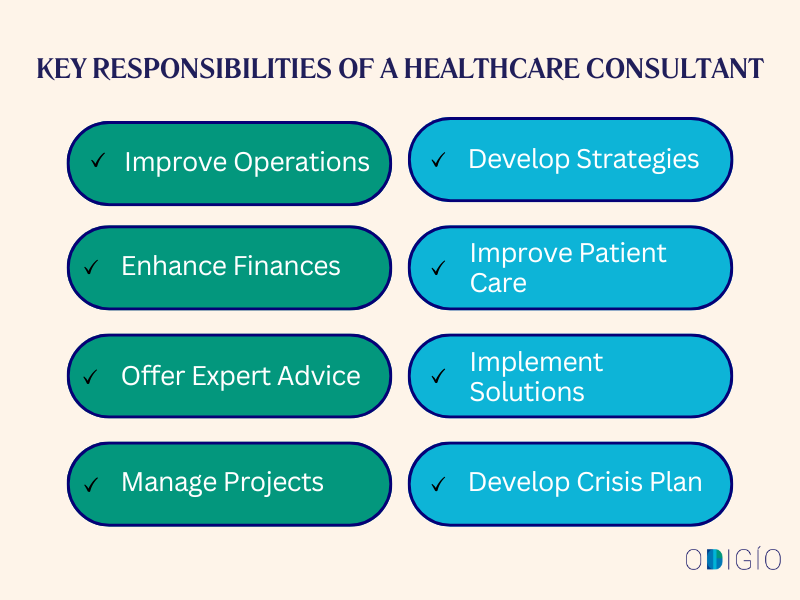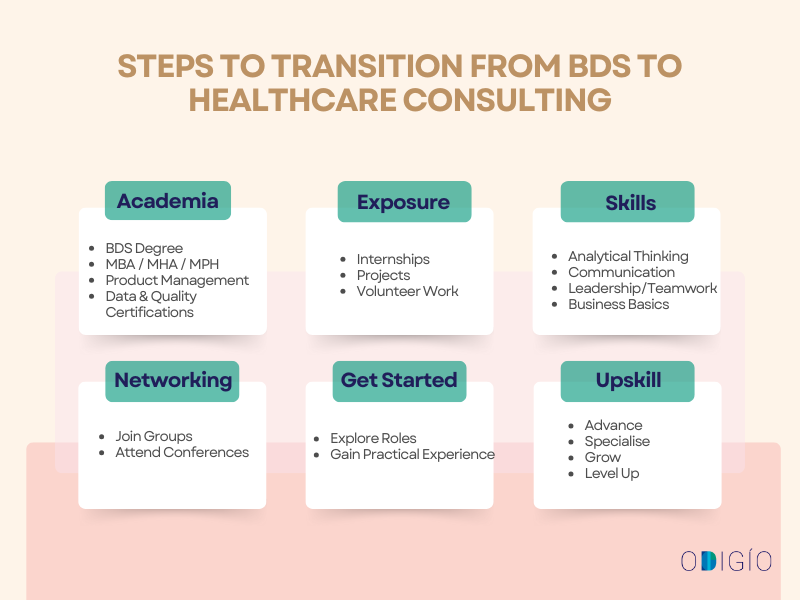Healthcare Consultant After BDS in India
With the expansion of the healthcare industry, there is a corresponding increase in demand for healthcare consultants.
A healthcare consultant works across hospitals to analyse hospital operations and advise on improving their operations, reducing costs, and enhancing patient care.
Let us understand what healthcare consulting actually means.
Understanding Healthcare Consulting
A dentist in a clinic treats one patient at a time, while a healthcare management consultant helps improve how healthcare works for thousands of patients simultaneously.
Let’s understand the job role in detail below.
What Does a Healthcare Management Consultant Do?
A healthcare management consultant provides expert analysis and opinions on businesses within the healthcare industry.
Their role can involve improving patient outcomes, managing budgets, and navigating regulations and policies.
Here are some of the key responsibilities:
- Analyse and Generally Improve Operations: Consultants study current practices and identify areas for improvement, including costs and inefficiencies, within a hospital, clinic, or other healthcare establishment.
- Develop Strategies: They develop strategic plans that help organisations achieve new objectives and drive transformation, as well as navigate shifting regulations and policies.
- Enhance Finances: This involves evaluating billing and coding, enhancing revenue cycles, reducing costs, and optimising procurement.
- Improve Patient Care: Consultants identify methods to enhance patient care and service delivery.
- Offer Expert Advice: They advise administrators and executives on health policy, industry trends and best practices.
- Implement Solutions: Consultants implement the recommended changes or provide detailed recommendations for others to implement.
- Manage Projects: Manage and oversee implementations of strategies to improve patient satisfaction and safety.
- Develop Crisis Plan: Prepare response protocols for crises.

Difference Between Clinical Dentistry and Healthcare Consulting
- Main Focus: Improving healthcare systems
- Workplace: Boardrooms, hospitals, pharma, insurance, government health projects
- Skills Used: Analysis, strategy, communication, business knowledge
- Goal: Improve efficiency, quality, and access for thousands of patients
- Impact Area: Entire healthcare organisations and policies
- Main Focus: Treating individual patients
- Workplace: Clinics, dental hospitals
- Skills Used: Diagnosis, treatment, hands-on procedures
- Goal: Improve one patient’s oral health
- Impact Area: Patients
Need More Info on Healthcare Consultation?
Ask our expert
Now that we know what consultants do, let’s explore why dental graduates are surprisingly well-suited for this role.
Relevance of Healthcare Management Consulting for BDS Graduates
Healthcare management consulting is a relevant career choice for dentists because it enables them to apply their clinical knowledge in a non-clinical setting.
Your healthcare experience equips you to offer expert support and training to healthcare-related organisations, driving better operations and improved service outcomes.
Let us know why a healthcare management consultant is a good fit for a BDS graduate in detail below:
Scope of Healthcare Management Consulting for BDS Graduates
The scope of a health management consultant is broad and rapidly growing, especially after an MBA in Healthcare/ Hospital/Healthcare Management or an MHA.
Industry Overview in India
Indian healthcare is one of the rapidly developing industries.
It has already surpassed US$370 billion in 2022 and is expected to approach US$610 billion by 2026, according to Nexdigm.
The increasing demand signifies an increase in specialised and high-quality healthcare facilities.
Key products and services fueling this growth include:
- Hospitals and corporate hospital chains
- Medical devices and diagnostic equipment
- Clinical trials and telemedicine
- Health insurance and medical tourism
Large-scale investments by private equity firms and existing hospital groups accelerate this expansion.
The COVID-19 pandemic further underscored the need for a robust healthcare infrastructure, prompting the government and private sector to invest heavily in healthcare services and reforms.
Eligibility and Skills Required for Health Management Advisors
Healthcare management positions require a blend of clinical and business knowledge.
Generally, one must hold a bachelor’s degree in a field related to health sciences, public health, nursing, or a closely related field.
Some jobs may also require a master’s degree or specific certifications as qualifications.
Let’s understand this in detail below.
Educational Background and Additional Qualifications
A BDS (Bachelor of Dental Surgery) is a good starting point for becoming a Healthcare Management Consultant; however, consulting requires more than just clinical knowledge.
Most BDS graduates would also involve themselves in further qualifications to be competitive, including:
- MBA (Master of Business Administration) or healthcare/hospital management.
- A Master of Health Administration (MHA) or a Master of Public Health (MPH) is used to gain a deeper understanding of healthcare systems and policies.
- Certifications include Lean Six Sigma, project management, data analytics, and healthcare quality improvement.
These supplemental qualifications bridge the gap between clinical training and business prospects, making BDS graduates more competitive in the job market.
Make Your Transition Easy
Talk to an expert
What are the Essential Skills Required?
Besides academic degrees, skills are equally important in becoming a successful healthcare management consultant. Some of the most significant ones are:
- Analytical Thinking to break down data, diagnose issues and propose solutions.
- Communication Skills for comprehensively presenting complicated concepts to hospital administrators, policymakers, or non-medical stakeholders.
- Leadership and Teamwork: to lead projects and coordinate with doctors, managers, and technical teams.
- Business and Financial Knowledge: of health care expenses, budgets and efficiency.
- Problem-Solving Mindset: to find solution-oriented methods of improving systems and patient care.
This combination of qualifications and skills prepares BDS graduates to enter Healthcare Management Consulting, where clinical expertise and strategic thinking matter.
Healthcare Consultant Salary in India?
According to the data, the average salary of a health consultant with 1 year of experience starts at Rs. 1.5 Lakh annually and can go upto Rs. 20.7 Lakhs as the experience increases
How to Transition from BDS to Healthcare Management Consulting
Here is a step-by-step guide on how to start a career as a healthcare management consultant.

Roles in Healthcare Consulting
As BDS graduates transition to Healthcare Management Consulting, they shift their focus from direct patient care to addressing broader issues within the healthcare system.
In this role, consultants serve as problem solvers, strategists, and advisors to hospitals, pharmaceutical companies, insurers, and government agencies.
Project Types in Healthcare Management Consulting
The career in Healthcare Management Consulting offers numerous opportunities for graduates holding a Bachelor of Dental Surgery (BDS) qualification to combine clinical expertise with business strategy.
Some of the most important ones include:
- Healthcare Analyst: Gathers and interprets hospital or patient information to facilitate decision-making.
- Junior Consultant: Aids in projects that are aimed at enhancing healthcare delivery, hospital management, or patient experience.
- Project Associate: Assists the consulting units with research, reporting and workflow optimisation.
- Healthcare Consultant: Advises hospitals, clinics, and insurance plan providers regarding operational efficiency, cost reduction, and strategic planning.
- Hospital Operations Consultant: Focuses on improving day-to-day hospital operations and patient care systems.
- Pharma / Life Sciences Consultant: Pharma work with pharmaceutical companies to develop their products, access the market and meet regulatory requirements.
- Public Health Consultant: Prepares programs and policies to enhance healthcare delivery in the community or nationally.
- Digital Health Consultant: Provides advice on telemedicine, health information technology systems, and AI-based healthcare solutions.
- Senior Consultant / Manager: Leads projects, supervises junior employees, and does not fixate on healthcare clients.
- Director / Partner: Forms organisational strategy, drives key initiatives and influences healthcare policy decisions.
What are the Challenges Faced by BDS Graduates in the Consulting Business?
The process of transitioning between dentistry and healthcare management consulting can be both exciting and overwhelming.
The barriers commonly observed are discussed below, along with possible remedies.
Conclusion
Healthcare Management Consulting is not an option, but itself is a path that allows BDS graduates to combine clinical and strategic skills to impact healthcare at a larger scale.
The Indian healthcare sector is developing rapidly, and attention towards professionals with a dual perspective of both medical and managerial aspects is expected to rise.
With the right qualifications, strong professional connections, and solid experience in consulting, it is possible to become a valuable bridge between medicine and management.
Finally, the replacement of BDS by Healthcare Management Consulting is not an act of leaving dentistry, but rather an increase in its influence.
A consultant not only treats patients but also participates in transforming the structure that serves them.
Transition to Healthcare Consultant Role Today!
